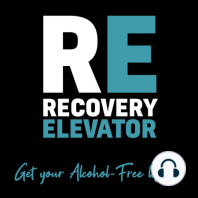47 min listen

RE 396: The Brain and Alcohol | Genetic Predisposition
RE 396: The Brain and Alcohol | Genetic Predisposition
ratings:
Length:
61 minutes
Released:
Sep 19, 2022
Format:
Podcast episode
Description
Episode 396 - The Brain and Alcohol – Genetic Predisposition Today we have Rene. He is 33, from California, and took his last drink January 18, 2022. Register for RE’s AF Photo Class: https://www.recoveryelevator.com/afphoto/ SoberLink: https://www.soberlink.com/recovery-elevator Highlights from Paul Alcohol has many biochemical and neurochemical effects on the brain. There are dramatic changes in the neurons that control the release of serotonin when we consume alcohol. Serotonin is the feel-good chemical and 80% of it is created in the gut. When we mix alcohol and serotonin it gets converted into acetaldehyde. This acetaldehyde acts as a toxin. Alcohol changes the relationship between the hypothalamus, the pituitary gland, and the adrenals. The adrenals release chemicals called epinephrine and cortisol, which are involved in the longer-term stress response. People who consistently drink are more stressed out at baseline. They have more cortisol released form their adrenal glands even when they are not drinking. Consequently, they feel more stressed and more anxiety when they are not drinking. Many scientists agree that stress is the number one contributor to disease. When we overload the brain with alcohol, it’s almost too much to process and the activity of neurons in the hippocampus, which is involved with memory formation, are strained and then they completely shut off – that is a blackout. You can still be functioning, some high functioning, but the memory forming part of your brain, the hippocampus, clocks out. Many believe that alcoholism is hereditary. Recent studies, including one of twins conducted by Dr. Gabor Mate indicate genetics may not be as much of a contributor as we once thought. Epigenetics indicate that environment influences gene expression and gene mutations. Science is beginning to accept that environmental factors cause or influence addictions. The ten-fold increase in alcoholism supports that theory. Dr. Andrew Huberman’s podcast provides much more detail on the science behind many of these theories. Take a listen if you would like to learn more: https://open.spotify.com/episode/2ebY3WNejLNbK47emgjd1E?si=bf71f9f038bc4826 Better Help: www.betterhelp.com/elevator - 10% off your first month. #sponsored [14:37] Rene has been sober for over six months. He is 34 and a single Dad He is an entrepreneur and enjoys going to the gym, exploring the outdoors, hiking and the beach. Rene is first generation American, and his family is very supportive. He grew up around drinking, it was normalized. He got drunk once during his senior year of high school. He didn’t drink again until after he broke up with his first girlfriend years later. Drinking became a reward, then it became a daily habit. Working in the restaurant industry, drinking was expected. He was fired once for drinking. It didn’t occur to Rene that drinking was a problem. He began counseling and the counselor recommended AA. Rene found it easy to see the similarities; he felt like he found his people. He was planning to join the military when he learned he was about to become a father. Eventually, he won sole custody of his daughter which dashed his hopes of joining the military. The combination of issues sent him back to drinking. He controlled his drinking for over a year, and it worked until it didn’t. Rene went back to AA and got a sponsor and a fitness coach. Consistency helps him maintain his sobriety. He is feeling mentally and physically strong. [57:35] Kris’s Summary Seasonal shifts can put you on edge. Share your experience: kris@recoveryelevator.com. Upcoming events, retreats, and courses: You can find more information about our events Resources Connect with Cafe RE - Use the promo code OPPORTUNITY to waive the set-up fee. Recovery Elevator YouTube - Subscribe here! Sobriety Tracker iTunes
Released:
Sep 19, 2022
Format:
Podcast episode
Titles in the series (100)
005: You've got to be kidding me, he's an alcoholic also?: When I found out one of my brother's best friends is an alcoholic I was blown away; an a little upset that we hadn't connected years before so we could have been working together. Here are some of the resources that Elliot likes. Joe and... by Recovery Elevator ?